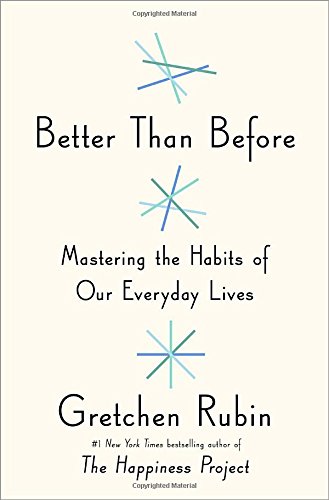Longtime readers of this blog may know I’m a huge fan of Gretchen Rubin – I loved The Happiness Project, which helped me through a tough time in my life. So when I had the opportunity to read her new book, Better than Before, I jumped at the chance.
Better Than Before is Rubin’s foray into habits – the everyday behaviors that help us achieve happiness – or do the opposite. While the Happiness Project dealt with Rubin’s year-long personal quest to achieve happiness, this book is a more general exploration of the things that shape our habits, strategies we can use to help build positive habits, and pitfalls to avoid. The book is peppered with Rubin’s personal anecdotes, but also those of friends and relations.
If I had doubts about Rubin’s need to achieve happiness, her quest for self-improvement rings a little hollow here. A self-described “exercise zealot” and “underbuyer” who never eats sweets, goes to bed early and is a natural “upholder” (more on that later) is a bit hard to relate to when it comes to correcting our behaviors. Her sister, Elizabeth, the frequent target/beneficiary of Rubin’s habits reformation throughout the book, is someone who is easier to find yourself in – she struggles with fitting exercise into a busy schedule as a working mom, finds a l0w-carb diet appealing but difficult to maintain in the face of office birthday parties and work stress, and she stays up too late. (Elizabeth, if you want to hang out sometime, I’m in LA.) Elizabeth finds some behaviors that work for her (and some that don’t), and you probably will, too, if you read this book.
There’s some good stuff here. I liked the classification of people by how they react to expectations – Upholders, who conform to both inner and outer temptations, Questioners, who only conform to inner expectations that make sense to them (and outer expectations that have translated into inner expectations), Obligers, who have trouble keeping their own promises to themselves, but meet the expectations of others, and Rebels, who chafe at any expectations whatsoever. You can take the quiz to find your own tendency here. I find myself bouncing between questioner and obliger (though Rubin says I’m probably an obliger – I really think I’m an obliger in some areas – really in my inability to develop a good exercise habit – and a questioner in others). Knowing how you respond to expectations does help create a framework for changing a habit – meeting a nutritionist, or a trainer, for example, might help an obliger who would otherwise find it difficult to follow an eating or exercise regimen. If you’re a questioner, do your research, and if you’re a rebel – well, there aren’t a lot of things rebels can do other than define a behavior as part of their personal identity. Another useful distinction is to think about whether you are an abstainer or a moderator – abstainers find it easier to give up something altogether, moderators find it easier to tell themselves they can have something in moderation. Most people think they’re moderators, but if you’re struggling with a behavior, you might try the abstinence route.
The book also explores some obstacles to developing better behaviors, like 10 categories of loopholes (aka the lies we tell ourselves), and one I found most interesting – the pitfall of the finish line. When there’s a finish line in site – dieting before an event, training for a marathon, giving something up for Lent – the good behaviors that we pick up are easily abandoned once the finish line is reached. Instead, you should think about adopting a behavior forever.
I’m using the word “behavior” because that’s what this book is really about, rather than habits. Yes, Rubin is talking about an everyday behavior, and striving to develop a “no thought” approach to positive behaviors, but she doesn’t really get into the neurological basis of habits, which controlled by an entirely different area of our brain than conscious decisions. There are ways to identify and change habits, which include identifying triggers or cues. Although Better than Before does talk about the appeal of decision free good behavior, Rubin doesn’t talk much about how to turn a repeated behavior into a habit (or how to break existing habits). For more of that discussion, I’d highly recommend checking out Charles Duhigg’s fascinating book, The Power of Habit: Why We Do What We Do in Life and Business.
Despite some of the limitations of Better than Before, I really did enjoy it and would give it a solid four stars. Rubin is an engaging writer and her thought processes are clearly laid out. Books like this frequently get overly repetitive, and this one mostly avoids that trap – offering new and useful information. If you’ve got a behavior you’d like to change (or just think about changing ) this book will definitely get you thinking about strategies to adopt and obstacles to avoid. Better than Before also gives the readers some interesting tools for self-knowledge that will enrich your life even if you don’t have any behaviors you want to change. It’s definitely a worthwhile read, even if it isn’t perfect. After all, none of us are.
Note: I received a free Advance reader’s copy of this book through Netgalley but was not compensated for the review. All opinions are my own.


